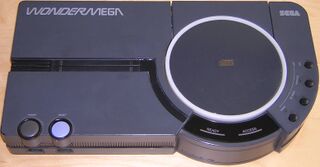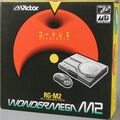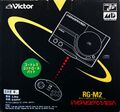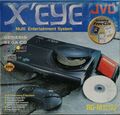Difference between revisions of "Wondermega"
From Sega Retro
m (made Prize Fighter a link) |
(Cleanup) |
||
| Line 3: | Line 3: | ||
| consoleimage=Wondermega.jpg | | consoleimage=Wondermega.jpg | ||
| imgwidth=320px | | imgwidth=320px | ||
| − | | name=Wondermega / X' | + | | name=Wondermega / X'Eye |
| − | | maker=[[Sega]], [[JVC]] | + | | maker=[[Sega]], [[JVC]]/[[Victor]] |
| variants= | | variants= | ||
| add-ons= | | add-ons= | ||
| processor= | | processor= | ||
| europe= | | europe= | ||
| − | | usa= | + | | usa=Spring 1994 (X'Eye) |
| − | | japan= | + | | japan=1992 (original Wondermega), 1993 (Wondermega M2) |
| australia= | | australia= | ||
| benelux= | | benelux= | ||
| Line 19: | Line 19: | ||
}} | }} | ||
| − | The '''Wondermega''' | + | The '''Wondermega''' is a combined [[Sega Mega Drive]] and [[Mega CD|Mega CD]] which was made by JVC/Victor and was initially released in 1992. It features a DSP for audio enhancement, a [[MIDI]] output jack, two microphone inputs and S-video output. In 1993, a redesigned model known as the Wondermega M2 was released, which dropped several features (including the MIDI output, DSP and motorized disc door) but added wireless controllers. |
| − | |||
| − | + | Like the Mega CD, the Wondermega and X'Eye are compatible with [[CD plus G|CD+G]] (CD and Graphics) discs. The original Wondermega also supported the "Wonder CD" peripheral, which included a full complement of MIDI jacks (in, out and thru) as well as a music keyboard called the "Piano Player". | |
==Models== | ==Models== | ||
| − | There were | + | There were several models of the Wondermega, though sales never reached that of the standard Mega Drive or Mega CD units, due to the Wondermega's substantial price. |
===Wondermega, Sega Model=== | ===Wondermega, Sega Model=== | ||
| − | The first Wondermega model came from Sega themselves, and was only released in Japan. The control pad included is | + | The first Wondermega model came from Sega themselves, and was only released in Japan. The control pad included is identical to that found in a regular Japanese Mega Drive package. One of the more novel features of the original Wondermega is a motorized disc door, which automatically opens or closes at the touch of a button. |
| + | |||
| + | The original Wondermega was packaged with a CD called ''[[Wondermega Collection]]'' that included ''[[Quiz Scramble Special]]'', ''[[Flicky]]'', ''[[Pyramid Magic]]'' and ''[[Puzzle Fighter]]''. | ||
| + | |||
<gallery> | <gallery> | ||
File:Wondermega.jpg|Console | File:Wondermega.jpg|Console | ||
| Line 40: | Line 42: | ||
File:Wondermega rgm1.jpg|Console | File:Wondermega rgm1.jpg|Console | ||
File:Wondermega2.jpg|CD area | File:Wondermega2.jpg|CD area | ||
| − | File:Wondermega3.jpg| | + | File:Wondermega3.jpg|DSP preset buttons |
File:Wondermega4.jpg|Karaoke buttons for recording/mixing | File:Wondermega4.jpg|Karaoke buttons for recording/mixing | ||
File:Wondermega5.jpg|Power/reset buttons, controller ports | File:Wondermega5.jpg|Power/reset buttons, controller ports | ||
| − | File:Wondermega6.jpg|Audio/video output | + | File:Wondermega6.jpg|Audio/video output and MIDI output |
File:Wondermega RGM1 JP Box Front.jpg|Front of box | File:Wondermega RGM1 JP Box Front.jpg|Front of box | ||
File:Wondermega gamepad.jpg|Victor Wondermega-branded gamepad | File:Wondermega gamepad.jpg|Victor Wondermega-branded gamepad | ||
| Line 49: | Line 51: | ||
===Wondermega, Victor RG-M2 Model=== | ===Wondermega, Victor RG-M2 Model=== | ||
| − | Sweeping changes were made in the RG-M2 model, | + | Sweeping changes were made in the RG-M2 model, released by Victor in 1993. The [[DE-9]] controller ports have been moved to the back, and in their place, an infrared receiver. M2 wireless controllers are very different in design from Sega's models and feature six buttons. The M2 employs numerous cost-cutting measures, resulting in a slightly smaller unit with a sleeker design. |
<gallery> | <gallery> | ||
| − | File:Wondermega rgm2.jpg|Console, now with | + | File:Wondermega rgm2.jpg|Console, now with infrared wireless controllers |
| − | File:Wondermega rgm2 2.jpg| | + | File:Wondermega rgm2 2.jpg|Karaoke and headphone volume dials |
File:Wondermega rgm2 3.jpg|Audio/video output, with extra controller ports | File:Wondermega rgm2 3.jpg|Audio/video output, with extra controller ports | ||
File:Wondermega rgm2 box front.jpg|Front of box | File:Wondermega rgm2 box front.jpg|Front of box | ||
| Line 60: | Line 62: | ||
</gallery> | </gallery> | ||
| − | ===X' | + | ===X'Eye=== |
| − | + | During the spring of 1994, JVC released the Wondermega M2 as the X'Eye in the United States, albeit with several features from the M2 removed. The S-video connector was removed in favor of the 9-pin AV port used by the Mega Drive II (although some X'Eyes lack this) and the wireless controllers were dropped, with standard 9-pin controller ports in place of the M2's infrared receiver. | |
| + | |||
| + | The X'Eye was packaged with ''[[Prize Fighter]]'', ''[[Compton's Interactive Encyclopedia]]'' and a Karaoke CD that included the songs ''Achy Breaky Heart'' and ''Two Princes''. | ||
<gallery> | <gallery> | ||
File:Xeye.jpg|Console | File:Xeye.jpg|Console | ||
Revision as of 04:13, 29 November 2011

|
| Wondermega / X'Eye |
|---|
| Manufacturer: Sega, JVC/Victor |
The Wondermega is a combined Sega Mega Drive and Mega CD which was made by JVC/Victor and was initially released in 1992. It features a DSP for audio enhancement, a MIDI output jack, two microphone inputs and S-video output. In 1993, a redesigned model known as the Wondermega M2 was released, which dropped several features (including the MIDI output, DSP and motorized disc door) but added wireless controllers.
Like the Mega CD, the Wondermega and X'Eye are compatible with CD+G (CD and Graphics) discs. The original Wondermega also supported the "Wonder CD" peripheral, which included a full complement of MIDI jacks (in, out and thru) as well as a music keyboard called the "Piano Player".
Contents
Models
There were several models of the Wondermega, though sales never reached that of the standard Mega Drive or Mega CD units, due to the Wondermega's substantial price.
Wondermega, Sega Model
The first Wondermega model came from Sega themselves, and was only released in Japan. The control pad included is identical to that found in a regular Japanese Mega Drive package. One of the more novel features of the original Wondermega is a motorized disc door, which automatically opens or closes at the touch of a button.
The original Wondermega was packaged with a CD called Wondermega Collection that included Quiz Scramble Special, Flicky, Pyramid Magic and Puzzle Fighter.
Wondermega, Victor RG-M1 Model
The first Victor model, RG-M1, is identical to the above, but has Victor branding. It also shipped with a custom Victor Wondermega controller.
Wondermega, Victor RG-M2 Model
Sweeping changes were made in the RG-M2 model, released by Victor in 1993. The DE-9 controller ports have been moved to the back, and in their place, an infrared receiver. M2 wireless controllers are very different in design from Sega's models and feature six buttons. The M2 employs numerous cost-cutting measures, resulting in a slightly smaller unit with a sleeker design.
X'Eye
During the spring of 1994, JVC released the Wondermega M2 as the X'Eye in the United States, albeit with several features from the M2 removed. The S-video connector was removed in favor of the 9-pin AV port used by the Mega Drive II (although some X'Eyes lack this) and the wireless controllers were dropped, with standard 9-pin controller ports in place of the M2's infrared receiver.
The X'Eye was packaged with Prize Fighter, Compton's Interactive Encyclopedia and a Karaoke CD that included the songs Achy Breaky Heart and Two Princes.



















